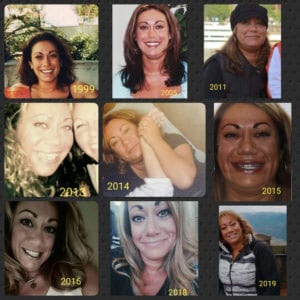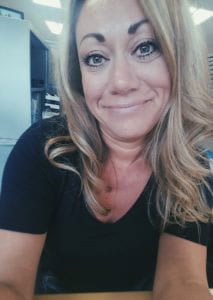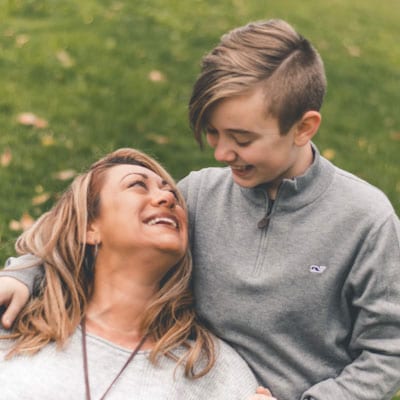In 2012 Tessa noticed a gap between her front teeth. She was a little confused. She had had braces when she was younger and her teeth hadn’t had any gaps after that, until now. She didn’t think much of it until one day she discovered her teeth felt loose- She could wiggle them with her tongue.
Then, she worried. Was she going to become toothless? She went to her orthodontist and had an x-ray done of her jaw.
Her orthodontist told her she needed braces again, but also that he had noticed something concerning. He asked Tessa to make an appointment with her doctor.
The x-ray he had taken showed that her jaw had dropped an inch and shifted forward. It should not be moving at her age.
He had seen one other person in his career with a similar presentation, and they had something called acromegaly.
Tessa called her doctor, made an appointment, and explained that she had just gone to see if she needed braces but her orthodontist said she should get a full hormone panel done.
Her doctor ordered the tests. When the lab results came back, they showed Tessa’s IGF The insulin-like growth factor) was elevated. Tessa had no idea what this meant. Her doctor referred her to an endocrinologist, and she made that appointment as well.
Before she got in to see the endocrinologist she was asked to take an Oral Glucose Tolerance test and have an MRI done. Tessa was becoming nervous. She was going through a lot of testing without much explanation.
When she finally met with the endocrinologist she was told in no uncertain terms “You have acromegaly. There is a tumor on your pituitary gland.”
This didn’t really clear things up. Tessa didn’t even know she HAD a pituitary gland, and moreover, was startled to learn it was in her head.
She watched as her endocrinologist drew pictures on the paper covering the examination table. Her endocrinologist mentioned referring her to a neurosurgeon and cold reality sunk in as she pictured a skull-opening brain surgery.
Tessa hardly had time to process this news. She left her appointment to go to her father’s appointment. She drove thinking, “I have a brain tumor” over and over again, but she couldn’t bring herself to speak those words aloud.
She met with the neurosurgeon and he made things sound easy. She had a large tumor and he was going to go in there –through her nose, not her skull like she had pictured- and grab it. She would spend one night in the ICU-maybe two- and then be home.
 Life doesn’t just stop when you get life-changing news. Tessa had to make arrangements with her job and for her son.
Life doesn’t just stop when you get life-changing news. Tessa had to make arrangements with her job and for her son.
Tessa prepared a will, wrote her son a letter, and recorded a video for him, just in case. She was scared.
After years of various issues that had seemed unconnected initially, gaps in her teeth, an increased ring size, and high blood pressure, Tessa went in for surgery in 2015 to remove the tumor behind it all.
The surgeon told her parents that the surgery went well and she was moved to recovery. She was put in a shared room and looks over to see another woman recovering. She asked how Tessa was. They soon realized they both had had the same surgery for the same condition, by the same surgeon.
When he came to check on Tessa and realized this himself, he commented that he doesn’t usually have his patients share rooms with one another, but since they were already talking, he let them be.
Tessa soon learned why this was. She couldn’t help but compare her progress to the other patient’s. She seemed to be in a lot more pain. The next day her nose started running. Her pain only seemed to be increasing, even while she was on morphine.
Her doctor came to check on her and noticed her mother constantly dabbing at her nose. He asked how often her nose was running, and said it could be a complication of the surgery, a CSF leak. Tessa was supposed to be getting discharged soon, but would now be kept to see if the leak slowed down.
Tessa thought of the other woman who had the same surgery on the same day, getting to go home.
Tessa was wheeled to another room to get a drainage tube in her spine to redirect the CSF. She was placed face down with a foam wedge under her, as blood and spinal fluid dripped from her nose. She could see how long the needle is. She didn’t know at the time, that her mother and son were outside the room and could hear her cries of pain.
They tried for 45 minutes to place the needle. Her skin was thicker than average because of the excess growth hormone. She was told they’d have to try a longer needle. She told them “no more today.”
Tessa was brought back to ICU, cotton taped under her nose, to be monitored. If the leak didn’t stop, she would have to go back into surgery.
“I don’t think I’ve ever prayed so hard in my life”
Her son fed her ice chips as they waited for the leak to stop.
After six days in the ICU the leak had stopped and she was finally able to go home.
Still in a lot of pain, she went to her parents’ house for a week, but it wasn’t long until she experienced another scare.
Tessa wasn’t able to use the left side of her body. She had to be carried down the stairs to be brought in for more scans to rule out severed nerves or a stroke. Luckily a nerve had just been hit while the spinal tube was attempting to be placed but, unfortunately for Tessa, she couldn’t walk for four days
She also was told that, contrary to the surgeon’s initial optimism, not all of the tumor was removed. She would need another surgery in the future.
Tessa was then contacted by her geneticist. Years prior, Tessa had been tested for BRACA, which came back negative. The geneticist wanted to do further testing now that the tests had advanced and now that they knew Tessa had acromegaly.

Tessa made yet another appointment. She then learned that she had a mutation that is linked to breast and ovarian cancer. She was told she had an 85% chance of developing breast cancer. Her options were monitoring every six months or a double mastectomy.
Less than a year after brain surgery, shortly after she had gone back to work, she chose to have a double mastectomy.
“I couldn’t risk the chance of looking my son in the eye and knowing I could have done something to prevent it.”
The recovery from the mastectomy wasn’t easy.
“Nobody prepares you for the emotional aspect of losing your breasts.”
As she was recovering, her IGF1 levels were being checked, and the number were going back up.
Tessa was dismayed. She hadn’t yet finished her breast reconstruction, but had to go back into brain surgery.
“I felt like I was losing who I used to be”
A year later, Tessa began to feel sick again though her doctor was telling her that from a biochemical standpoint, she was cured.
Tessa’s symptoms persisted and, knowing that her original endocrinologist had never treated anyone else with the condition, she decided to get a second opinion.
Taking a brief leave of absence from work, Tessa compiled all her imaging, reports, and test results, made spreadsheets, and went to an out of network endocrinologist.

Tessa is now seeing a new in-network endocrinologist who has been trying her on various medications to help with her symptoms. So far, she hasn’t experienced profound improvement, and she goes back to work soon, but she’s taking things one day at a time.
She has learned a lot about her condition, including risks for comorbidities and further testing she should have done. She found a support group –The Acromegaly Community that she credits with saving her when she was in such a dark place.
She has found a passion in helping others and knowing she could make a difference in the lives of others.
She even got a tattoo on her chest, just to remind her to keep going. The fight isn’t over yet.





